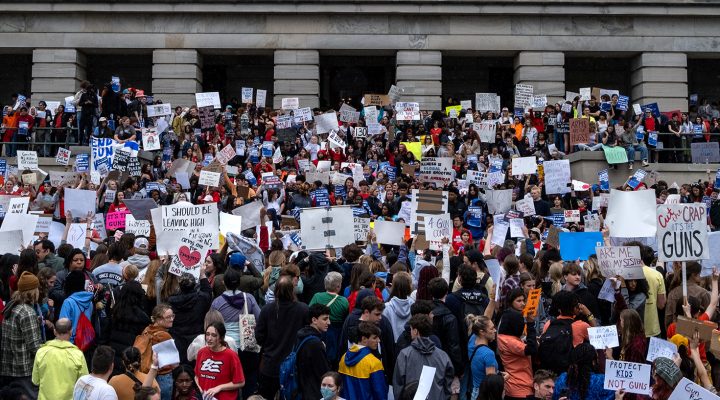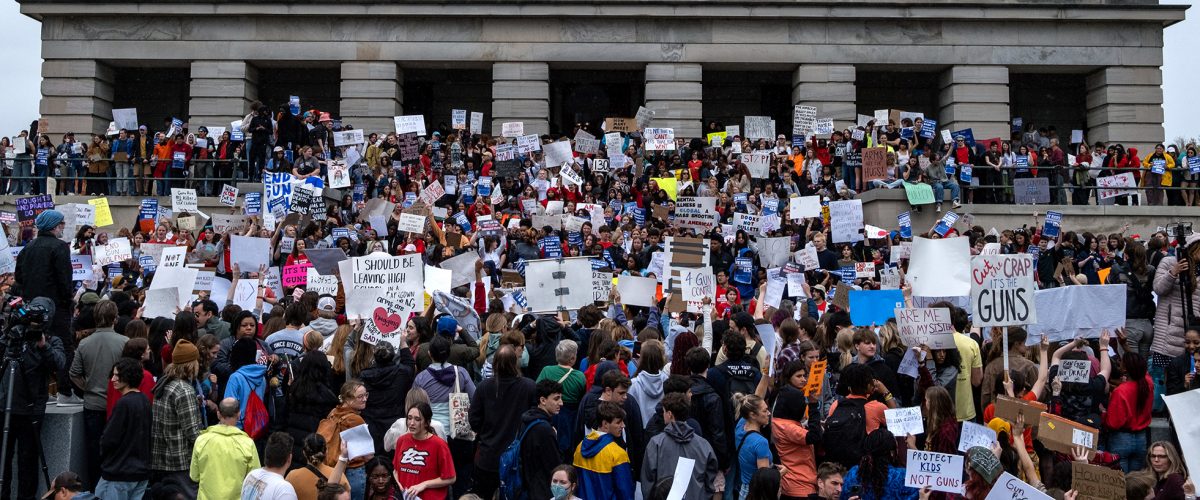They entered the city on March 24. Many came by foot. Some of them from the mount, not of Olives but the various mountains and hills that surround Nashville, Tenn.
They came with modern palm branches — protest signs.
The signs were familiar: Cries for our country to care more about our children than guns; cries of never again with lists of again and again and again; scrawled names of the murdered; facts about assault rifles and the lives they have taken since the assault rifle ban was allowed to expire; lists of cities where mass shootings have taken place, lists of every school where children have been slaughtered starting with Columbine and going through 376 mass shootings in schools since.

Laura Mayo
One modern palm branch, held high by a teenager, read, “We want to attend final exams, not funerals.”
They shouted “Hosanna” — which means save us — the words on everyone’s tongue. “Save us!” “Enough!” “Stop this!” “It doesn’t have to be this way!”
Jesus, in the last week of his life, marches deliberately into the center of local imperial power and religious collaboration. He paints such a passionate picture of the alternative realm of the kingdom of God that the Roman authorities cannot ignore him. Yet the church has managed to ignore Jesus’ message for centuries.
Stephen Patterson writes: “Is Jesus dead? Not yet. But what the Cross could not do, Christians could. We are killing Jesus. Jesus was a sage, or if one prefers, a prophet. Sages and prophets live by their words and deeds. In this sense, for most of us who assemble in the name of Jesus, he is dead. His words and deeds mean little to us, if anything at all. We do not look to Jesus for a way of life, but for salvation.”
He continues, “‘He died that we might live.’ Indeed. It seems we have to kill him in order that we might live whatever lives our power and privilege will allow us to lead. When real life is at stake, most of us will take personal salvation over the empire of God any day. So we prefer our Christ crucified, a once living Jesus silenced.”
This week, Jesus’ last, cannot be the silencing of Jesus. We must protest.
“This week, Jesus’ last, cannot be the silencing of Jesus.”
It cannot be about personal salvation and nothing more. It is about choices. It is about which kingdom will hold our loyalties, about how we will follow and who. About where we will march: the parade of military might or the parade of peace. About where we will worship: the house of prayer or the hideout for religious collaboration with injustice. About how we will we resist: with violence or non-violence. About how we will be disciples: with the outpouring of lavish love doing what we can do or with resentment that leads to betrayal. About how we will address the problems of this world: as part of the solutions and the creation of the realm of love here on earth or by sending away, by sleeping, fleeing, denying, deserting?
Which kingdom has our loyalty? The one where guns are protected while school children are slaughtered? The one where Black men are shot in their backyards? The one where threats of violence overseas are met with more and more violent rhetoric? The one where refugees are sent away, immigrants ripped from their families? The one with endless health care for the wealthy while the poor die from preventable illness because the medicine is too expensive?
Which kingdom has our loyalty?
“Your kingdom come on earth,” Jesus prayed and taught and lived. What if we did love God with everything: our hearts, our souls, our minds, our strength? What if we truly tried to love our neighbors and ourselves in equal measure?
This week, this last week, cannot be simply about personal salvation while our brothers and sisters die, not because of sin and depravity but in despair and oppressive systems, in school rooms and city streets.
Jesus counters until his dying breath the empire and religious collaboration with the violence and oppression. Jesus is calling us to live into our loyalty to the kingdom of God, indeed to follow him, even to the Cross, creating the realm of justice and love with each step.
Holy Week must be more than personal. Jesus shows us a realm of peace created not through violence but through love; a realm of justice created through sharing, compassion, economic transformation; a realm of welcome created through radical inclusion.
“Holy Week is Christianity’s primal narrative.”
Holy Week is Christianity’s primal narrative.
So often the meaning of this week has been focused exclusively on personal piety and morality with little to no recognition of the political implications. The empire executed Jesus to silence him. The church has left him on the Cross, telling us Jesus died for our personal sins, telling us to rejoice in personal forgiveness, focusing religious ambition on what happens after we die.
The meaning we make of Jesus’ last week matters. Much is at stake. Is Christianity primarily about individual morality and an afterlife? Or is it about the creation of the realm of God on earth?
In the Gospel of Mark, Jesus says, “The Son of Man came not to be served but to serve, and to give his life a ransom for many.”
The word “ransom” has been heard only as in sacrificial language. We’ve heard preacher after preacher say Jesus paid the ransom for our sins. But it almost certainly does not have this meaning in Mark. The Greek word translated as “ransom” (lutron) is used in the Bible not in the context of payment for sin, but to refer to payment made to liberate captives (often from captivity in war) or salves (often from debt slavery). A lutron, a ransom, is a means of liberation from bondage.
Jesus gave “his life as a ransom for many.” He gave his life as a means of liberation from bondage, from oppression.
“God has sent me,” Jesus said as we read in Luke, “to proclaim release to the captives and recovery of sight to the blind, to let the oppressed go free, to proclaim God’s favor.”
In John’s Gospel we read: “Believe me that I am in God and God is in me; but if you do not, then believe me because of the works themselves. Very truly, I tell you, the one who believes in me will also do the works that I do and, in fact, will do greater works than these, because I am going to God.”
“God’s kingdom has not yet come on earth. We must work for justice.”
The greater works need to be done. God’s kingdom has not yet come on earth. We must work for justice. We must work for peace. We must follow in the way of strong, demanding love. We must believe Jesus — not believe in him but believe him.
I believe Jesus about God’s love. I believe Jesus that we should love our neighbors and our enemies. I believe Jesus that when we think we have all the answers and everything of value we need to go back to zero to really see things clearly. I believe Jesus about caring for the poor and the marginalized.
To believe in Jesus is certainly more than a theological claim; it is the action of following.
Jesus, when calling the disciples, does not ask them to believe any theological statements; he asks them to follow him. And they do. They follow him in love, working for the realm of God.
The love of following is not easy love, it is not emotional bosh. This is the love of resistance, this is the love that demands our courage, our strength, our willingness to see what is happening and then refuse to ignore it, not just see, but act. The long and murderous history of racism, transphobia, and the glorification of guns must be interrupted. No more. We must speak and work with outraged love for justice.
We must not let this week silence Jesus.
If we listen, we can hear him still. I heard him in the video of the rally against gun violence in Nashville, saw him out of the corner of my eye, waving his palm branch.
Laura Mayo serves as senior minister of Covenant Church in Houston. She is a graduate of Carson-Newman University and Wake Forest Divinity School, with additional studies at Regent’s Park College of Oxford University. She is active in various interfaith projects and organizations in Houston.


